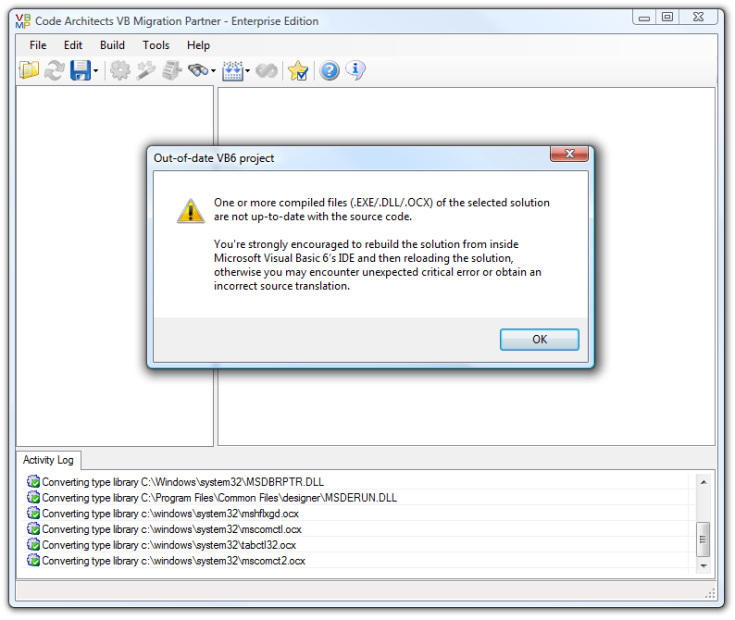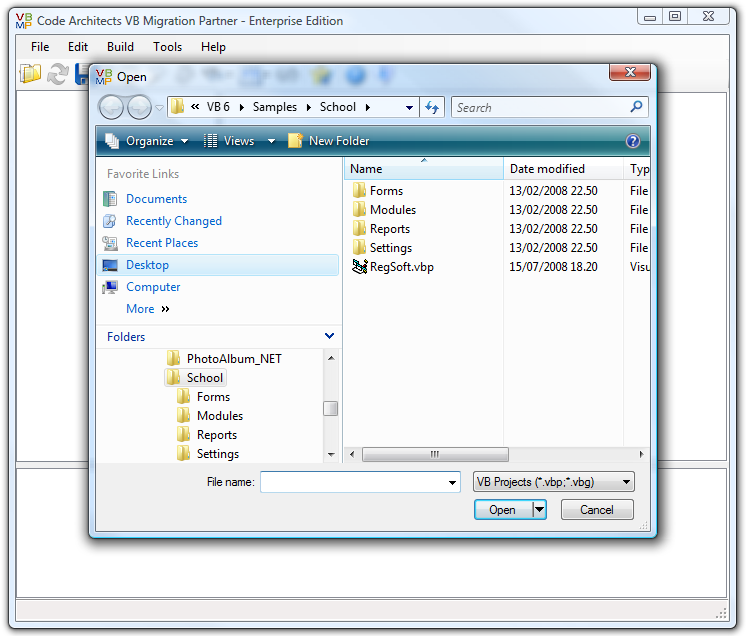Our VB.NET to C# converter (Instant C#) is a Windows program which accurately converts VB.NET code to C#. VB6 to VB.net conversion [closed]. This is an exact duplicate of several other questions on VB6 migration tools. In my opinion. How to convert vb6 to vb.net. VB.Net has a built-in migration tool, but converting VB6 code to VB.NET isn’t as easy as loading it to the newer software. The migration tool does a lot of the work, especially with syntax, but nowhere near all of it.
Exact duplicate: Best strategy for moving applications from VB6 to VB.Net
Exact duplicate: Conversion tool comparisons for VB6
can any one please tell the tool which converts vb6 to vb.net
thanks dagg
closed as not constructive by casperOneAug 30 '12 at 11:25
As it currently stands, this question is not a good fit for our Q&A format. We expect answers to be supported by facts, references, or expertise, but this question will likely solicit debate, arguments, polling, or extended discussion. If you feel that this question can be improved and possibly reopened, visit the help center for guidance. If this question can be reworded to fit the rules in the help center, please edit the question.
5 Answers
There is one that comes with vb.net. When you open a .vbp vb6 project, it asks if you would like to automatically convert it to vb.net. It does a pretty good job, exclusive of third party add-ons.
xpdaxpdaMicrosoft Corp just published a world-wide case study based on the successful VB6 migration project:
You can also try Visual Basic Upgrade Companion.
It generates VB .NET and C# and maps COM components to Framework components.
I believe that Visual Studio has a built-in VB6 -> VB .NET project and source conversion component built in. I haven't used it for a while, last time I did a conversion was with Visual Studio 2005. It was a little tricky, and there was still some manual clean up involved to get things working just right. I don't know what the VS2008 system is like.
FrustratedWithFormsDesignerFrustratedWithFormsDesignerThis is certainly not a trivial matter.
DotNetRocks recently did a show on this, which you will find here - Francesco Balena on VB to .NET Migration - http://www.dotnetrocks.com/default.aspx?showNum=491
This will introduce you to some of the issues, and indeed, a tool to do a conversion.
Stuart HelwigStuart Helwig
Not the answer you're looking for? Browse other questions tagged vb.netvb6vb6-migration or ask your own question.
Does anyone know a way to convert from VB6 code to C#?
Is there a tool that can do this for me?
MarkJ
closed as not constructive by user177800, Daniel Kelley, sgarizvi, koopajah, Laurent EtiembleFeb 13 '13 at 9:07
As it currently stands, this question is not a good fit for our Q&A format. We expect answers to be supported by facts, references, or expertise, but this question will likely solicit debate, arguments, polling, or extended discussion. If you feel that this question can be improved and possibly reopened, visit the help center for guidance. If this question can be reworded to fit the rules in the help center, please edit the question.
10 Answers
Convert Vb6 To Java
VisualStudio offers (or at least offered) a wizard to do a conversion from VB6 to VB.NET (which could then be converted to C# with a bit of work, possibly helped by #develop's VB.NET <-> C# converter), but when last I used it, for anything non-trivial there was a lot of manual work needing to be done so I suspect you're probably better rewriting or porting by hand if this is a large and/or important application.
theraccoonbeartheraccoonbearVb6 Convert To Vb.net Tools
It might come across as a little bit cheeky but your brain might be the best tool to use. Could be worth the re-write.
Maybe you don't need to porting it. Could the VB6 be turned into a COM component?Port to COM, call from C#, home in time for Judge Judy.
As someone who has done this a bunch of times, this is not an easy process. You can use the VB6 to VB.Net tool as stated in this answer, and then use either Reflector or SharpDevelop to convert to C#. With the SharpDevelop conversion, a few caveats. It screws up all the array references and thinks that they are function calls, and all the logical operators are converted to bitwise logical operators (And becomes & not &&). With Reflector you lose a bunch of stuff. Also the Visual Studio converter fails on a lot of large projects, just hangs and never completes.
Once you have got your code converted into C#, you have to start the real work. The conversion gets you at best 50% of the way there, you have to fix a ton of stuff (you will see your code littered with TODO's), refactor a ton of stuff, and at the end you are left with C# that is a representation of your VB6 -- unless you have very nice VB6 code not a place you really want to be. Also all of your code with be littered with the VB helpers rather than using proper DotNet functions (all the string functions are helpers rather than class objects, for examples0. If you used Variants at all those all have to be rewritten. If you used a lot of API calls, they tend to need rewritting.
In the end you will get a base, but converting a large project (20-30 forms, 30 classes, 30 modules) can take several man months. Rewritting from scratch, however, may take twice as long and you lose all of your business logic. So, it can be done (I have done it with 3 or 4 large projects), but there is no panacea, no silver bullet, and any tool that says it will do it for you alone, is lying.
Convert Vb6 To Vb 2005
Open your project with a new version of Visual Studio, convert your code to VB.Net and then download .Net Reflector to help you with the C# transformation.
Good luck!
Mark BiekArtinsoft (Now renamed to Mobilize.Net) does just this, especifically the Visual Basic Upgrade Companion.
However, even after using the VBUC there's still some parts that of the system that needs to be migrated/proofed by hand. But it's usually a much smaller set of the original problem. And some of the migration issues have been resolved thanks to experience with past migrations.
Vb6 To Vb 2010 Converter
Artinsoft is the same company that built the wizard that ships with Visual Studio, mentioned in theraccoonbear's post. However, if I'm not mistake the wizard only migrates VB6 to VB.Net.
Full disclosure: I work for Artinsoft
willvv Esteban Brenes
Esteban BrenesThe short answer is that VB6 and VB.NET (and consequently C#) are separate language but related languages. There are many subtle (Integer being Int32 instead of Int16) and gross differences (graphics, form, and printing engines) between the two platforms. You need to treat this as if you are converting to a completely different platform.
The issues is explored more fully here
There are 2 free ones that I use:
Scott and the Dev TeamScott and the Dev TeamMicrosoft recommends ArtinSoft’s Visual Basic Upgrade Companion (VBUC).
Microsoft and ArtinSoft have partnered to offer a free VBUC license to you. The discount code below can be used to purchase a license that will allow you to migrate an application of up to 10,000 lines of VB6 code to VB.NET or C# for free. It can also be applied when purchasing a larger license.
It's not perfect, resulting code still requires lots of manual fixes until it even compiles but still this tool is worth giving a shot.
Konstantin SpirinKonstantin SpirinOne question to ask yourself is, how important is it to have C# rather than VB.NET? If you're converting a large application, perhaps you should just upgrade to VB.NET, which will be cheaper.
There are some features in VB6 with no exact equivalent in C# (the error handling, late binding etc). Ask yourself why it's worth the manual effort to convert those, when you could go to VB.NET which does support them.
And if you don't believe me (and no-one's voted for my answer, sob sob!) maybe you'll believe Francesco Balena and Dan Appleman (in a book Moving to VB.NET) who agree with me.
MarkJMarkJAt GreatMigrations, we do this by hand -- we use our hands to develop a VB6/COM compiler. The compiler reads a VBP (or group of related VBPs) and referenced COM libraries and constructs a 'semantic model'. This model is an extremely detailed set of symbol tables and opcode streams that fully and accurately describe all information structures defined and operations performed by the source system.
The tool then applies a series of algorithms that modify and restructure the model to make it more compatible with .NET and optionally applies custom transformations; for example to replace COM components with .NET classes. The transformation rules are designed by people and created 'by hand' to meet their unique requirements.
Finally, the model is 'executed' but instead of allocating the data model and executing the operations, we author the file structures, data model, and operations in the notation of the target platform. We can author both VB.NET and C# using this approach. We also use this process to migrate ASP sites to ASPX, (we also have a multi-dialect FORTRAN-to-C product)
The approach does not produce production ready software on the first try, but it can be improved and made to produce 'better' software by modifying the configuration of the tool and re-running the translation process. The advantage of our tool is its repeatability, speed, and flexibility which facilitates an agile tool-assisted-rewrite methodology. IMO, migration teams that leverage our approach will benefit from allocating a lot more resources to evaluating alternatives for redesign, and development process improvements rather than to re-gathering functional requirements, hand coding, and testing. They will ultimately enjoy a more maintainable system and a much more faithful reproduction of the original application functionality after the migration as well as greater control and visibility during the migration.
A trial edition of our tool is available here gmStudio Trail Request Download. It will allow you to experiment with ASP/VB codes up to 10K LOC and runs for up to 30 sessions.